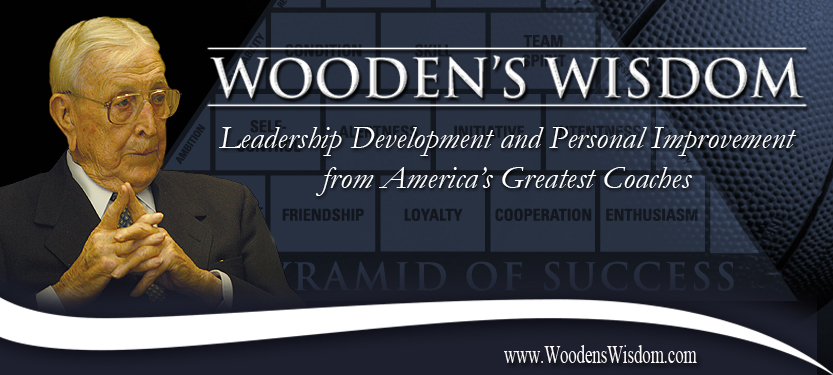 |
|
| Wooden's Wisdom - Volume 2 | Issue 61 |
| Craig Impelman Speaking | Championship Coaches | Champion's Leadership Library Login | |
|
TRUST
It is better to trust and occasionally be disappointed than to mistrust and be miserable all the time. This quote from Abraham Lincoln was a favorite of Coach Wooden's and a key principle that he used to define his approach to leadership and life.
A leader must have the trust of his or her followers. Trust is built by giving it first.
Mr. Wilfred Peterson, in his essay The Art of Leadership, described it as follows:
The Leader has faith in people. He believes in them, trusts them and thus draws out the best in them. The Leader is a people builder. The leader creates initiative in others.
In his book The Essential Wooden with Steve Jamison, Coach described the importance of trust and how to create it:
Without trust between a team and leader, there really is no team at all, just a collection of individuals who don't amount to much.
How does a leader create trust? Here's how: Do the things you should do and that those under your leadership have a right to expect from you. Show confidence in their ability to reach their potential. Help them overcome mistakes by getting to the core reason for errors or misjudgments without seeking to blame, condemn, or punish. Show those under your supervision that you believe they can succeed. Be fair. Be trusting. In short, be the kind of leader whose team of which you’d like to be a member.
Trust begets trust. Yours begets theirs. Be brave enough to trust, and it will be returned.
In Coach Wooden’s book with Steve Jamison, Wooden on Leadership, Fred Slaughter, the center of the 1964 National Championship team, recalls how Coach’s trusting leadership style affected Coach’s game management and him as a player:
I think there were four or five games in my career at UCLA when we started out behind something like 18–2—just getting killed. I’d look over at Coach Wooden, and there he’d sit on the bench with his program rolled up in his hand—totally unaffected, almost like we were ahead. And I’d think to myself, “Hey, if he’s not worried why should I be worried? Let’s just do what the guy told us to do.” And you know what? We won all those games except one, and even that was close. It’s the doggonest experience to see that. He was cool when it counted; his confidence and strength became ours. In my three years on the UCLA varsity team I never once saw him rattled.
In his book Wooden: A Lifetime of Observations and Reflections on and off the Court with Steve Jamison, Coach Wooden summarized his philosophy on trust:
It has been said that you will be hurt occasionally if you trust too much. This may be true, but you will live constantly in torment if you do not trust enough. Trusting is part of our higher nature. Doubting is a lower instinct. The latter is easy to do, the former more difficult - but so much more rewarding.
Yours in Coaching,
Craig Impelman
Twitter: @woodenswisdom
|
A Short Course
In Human Relations The Six Most Important Words: “I admit I made a mistake.” The Five Most Important Words: “You did a good job.” The Four Most Important Words: “What is your opinion?” The Three Most Important Words: “If you please.” The Two Most Important Words: “Thank you.” The One Most Important Word: “We” The Least Important Word: “I” |
|
For more information visit www.woodenswisdom.com |
|
© Copyright 2026 WoodensWisdom.com | # of Times Wooden's Wisdom Issues Opened: 7,885,707
Hosting & Design by:EverydayWebDesign.com